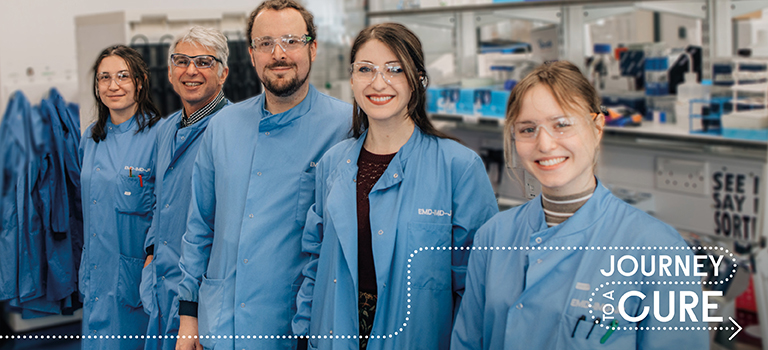Research into rogue cells - unlocking answers to find a cure for coeliac disease
Help this Oxford University team take us all one step closer to a cure for coeliac disease
Research into rogue cells at Oxford University can unlock vital answers about the immune response in coeliac disease. But we need your help.
When scientists recently took biopsies from patients with coeliac disease, they found a group of immune cells called intraepithelial lymphocytes (IELs) that each bear a similar protein molecule receptor on their cell surface.
This study wants to find out exactly what these IELs are reacting to, how they behave and which cells they interact with. This in turn, could eventually help us learn how to influence control of the immune reaction to prevent undue harm to the small intestine.
It could give us a phenomenal breakthrough – and everyone is keen to get started. But first we need to raise more funding*.
Any gift you can give, big or small, will go a long way.
- £35 could pay for an hour’s laboratory investigation into immune cell characteristics
- £75 could pay to isolate a patient's key cells and process tissue
- £150 could fund the cell culture and T cell cloning for one patient
If we can raise the funding, these rogue cells could unlock so many answers and change millions of lives. Thank you.
The Oxford University team hopes to find out:
- Which type of protein fragment these IELs react to
- Which type of molecule displays this fragment so it triggers the whole immune reaction
- What chemical signals are released by these stimulated immune cells.
To find this out they will be using advanced cell and molecular biology techniques to investigate key signals, proteins, and molecules. They'll be comparing the immune response of some patients with or without coeliac disease.
Plus, they'll even create a miniature model of the intestine, grown in the lab from patient tissue, to gain more insights into how these immune cells interact with other cells inside the human gut.
With your support the Oxford University team could soon be studying this newly discovered group of immune cells and we thank you for any gift you can give.
Other ways to donate
- By credit card - please click the 'Donate' button to use our online form or call 01628 201281
- To make a regular donation via Direct Debit please click here
- To send a cheque (made payable to 'Coeliac UK') via the post please download our donation form to complete, print and post to Coeliac UK, Artisan, Hillbottom Road, High Wycombe, Bucks, HP12 4HJ
- By BACS transfer - account name Coeliac UK, sort code 40-05-16, account number 31017691. Please reference your payment with RF2024, your surname and postcode
For any other queries, please call our Helpline on 0333 332 2033.
*We’re so grateful that the first £90,000 raised for this research project has been matched funded. But we still need to raise £250,000 in total to fund all three phases of this three-year project.
Please Note: All donations will be directed specifically to this research. In the unlikely event of circumstances changing as this research progresses, funds may be re-directed, but only to support research.

